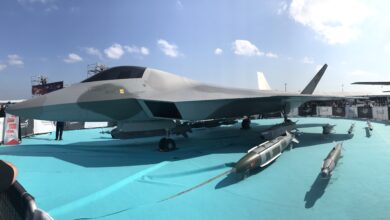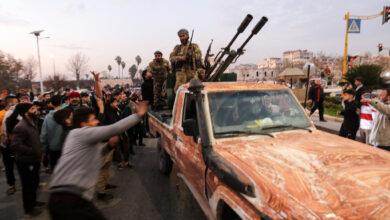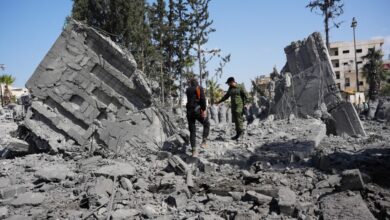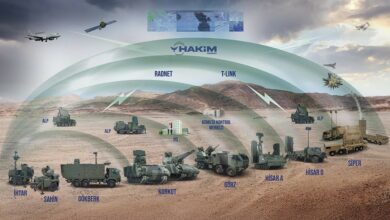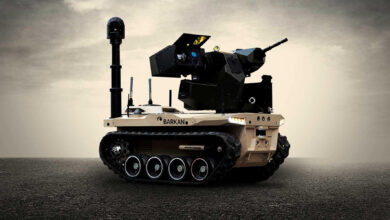Syriac Military Council plans imminent deployment to defend “our democratic project” in Efrin
MFS has not been asked to return weapons supplied for the fight against ISIS
Syriac Military Council (MFS) fighters will leave Hasakah in the coming hours to fight Turkey at the Efrin front, MFS spokesperson Abgar David told The Defense Post.
“We will send some of our groups in the next two days. These MFS forces are from Hassake forces,” David said on Tuesday. “Our forces in Deir Ezzor will complete their mission to the end because our war with ISIS didn’t end.”
On Monday, MFS, a Christian Syriac military organization, announced that it would send forces to Efrin “in support of SDF-YPG/J to the defense of the region and populations against Turkey and allied forces.”
Breaking: #Syriac Military Council, MFS will send fighters to the #Afrin front in support of SDF-YPG/J to the defense of the region and populations against Turkey & allied forces. #Syria (more info & statement will follow) pic.twitter.com/Mc0pHpR7XU
— SyriacMilitaryMFS (@SyriacMFS) January 29, 2018
Established in 2013, MFS, or Mawtbo Fulḥoyo Suryoyo, operates under the umbrella of the Coalition-supported Syrian Democratic Forces. The Bethnahrin Women Protection Forces (Ḥaylawotho d’Sutoro d’Neshe d’Beth Nahrin, HSNB) is its all-female wing created in 2015. The Syriac Security Office, Mawtbo d’Sutoro Suryoyo, commonly known as the Sutoro, is its linked police force that works alongside the Asayish police force in the self-proclaimed Democratic Federation of Northern Syria. All three organisations are linked to the Syriac Union Party.
The organization operates mostly in the Assyrian areas of Al-Hasakah governorate.
MFS forces – including foreign volunteers – participated in the battle against Islamic State in Raqqa, notably employing drones and snipers, as well as providing emergency medical aid.
It currently has units deployed to fight ISIS in the Middle Euphrates River Valley in Deir Ezzor province.

MFS spokesperson Kino Gabriel was promoted to official spokesperson of the SDF on January 20. The same day, NATO member Turkey launched Operation Olive Branch, conducting attacks against Kurdish-held Efrin canton with the help of tanks, heavy artillery and warplanes.
Ankara has stated that the goal of the campaign is to “neutralize the terrorists belonging to PKK/KCK/PYD-YPG,” as well as ISIS in northwestern Syria. Turkish President Recep Tayyip Erdogan has also repeatedly threatened to expand the offensive against the YPG to Manbij, east of Efrin, where U.S. troops are present.
There is no known ISIS presence in the area, but Ankara considers the predominantly-Kurdish People’s Protection Units (YPG), which makes up the backbone of the SDF, an extension of Kurdistan Workers’ Party (PKK), a designated terror group in Turkey and the U.S.
The YPG is not listed as a terrorist organization by the United States, and remains one of the main Coalition partners fighting ISIS in Syria.
MFS remains ‘committed’ to fighting ISIS in Deir Ezzor
The Coalition said it did not support Turkey’s unilateral action in Efrin. The Pentagon has warned, however, that its partner forces in the anti-ISIS campaign would lose Coalition support if they carry out military operations that do not target terrorists.
“It is DoD policy to stop supporting vetted Syrian opposition groups who turn towards priorities outside the defeat-ISIS fight,” Pentagon spokesperson Eric Pahon told The Defense Post.
“The department not condone or support VSO use of coalition-provided weapons and equipment to conduct missions outside the CJTF-OIR umbrella, and when they do, the DoD re-assesses their viability to participate in the equipping program. The actual process of ceasing this support is situationally-dependent, overseen by coalition advisors,” he added.
However, Washington has not yet asked MFS to return any equipment.
“Our mates in USA didn’t ask us to give back anything because we had these tools to help us in Deir Ezzor operation, and we are committed to finish it and liberate it from ISIS,” David said.
#Syriac Military Council, MFS fighters during Deir ez Zor battle against ISIS with the @coalition & @CENTCOM support. @HSNB_ pic.twitter.com/lxwVtJxcny
— SyriacMilitaryMFS (@SyriacMFS) January 27, 2018
In August, the Coalition allowed Liwa Shuhada al-Qaryatayn (ShuQ) – a militia in southern Syria which opted out from the fight against ISIS – to keep some small arms and light vehicles. According to Operation Inherent Resolve spokesperson Colonel Ryan Dillon, the militia unilaterally conducted patrols outside an agreed upon de-escalation zone near At Tanf, engaging in activities unrelated to fighting ISIS.
In November, 180 vetted Syrian opposition fighters based at Tanf were demobilized from Jaysh Maghawir Al-Thawra (MaT), retaining their U.S.-supplied M-16 rifles for personal protection, although other equipment was returned, a Coalition spokesperson told The Defense Post.
“Coalition Forces’ policy was to recoup heavy weapons and vehicles that had been issued,” the spokesperson said.
When asked whether the Syriac MFS would be required to return all but personal protection weapons and some vehicles, Pahon said he couldn’t speculate.
“As we have said all along, equipment provided to the SDF is limited, mission specific, and metered out incrementally as objectives are reached,” he said.
At present, the MFS forces are planning to remain in Efrin until “the mission” is over.
“Maybe we will send more and more forces there,” David said, noting that MSF “will fight in Manbij and any other place needed because we believe in our country Syria and we are prepared to defend it against any forces, whether Turkey or the terrorists.”
“We believe in standing together with our Kurdish and Arab brothers against any threat to the safety of our land and our democratic project,” he added.
After Efrin, Turkey will target all of northern Syria, envoy says



